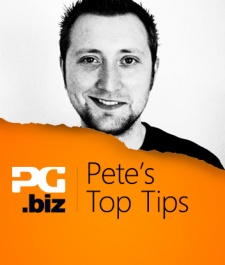I'm in Kiev right now, covering Casual Connect.
As part of this year's event there's something called the Indie Prize, which is a competition to find the best independently produced games from across the world. You can find out all about it on its website, if you like.
There are some cool games here, and I might well write about a few of them over on PocketGamer.co.uk, but I noticed that many of the teams taking part fell into some of the classic game event traps when demonstrating their work.
If you're an indie, you should know that showing off your game to the press is an art-form - it's why big publishers spend so much on PR - but since you don't have access to such specialists, you need to understand how to handle yourself and how to approach journalists in the right way.
You also need to have a firm grasp on the kind of pitfalls that are so easily sauntered into if you're not careful.
So here are my top five tips on how to court us, the gaming press. Following them all won't guarantee you a spot on the site after we've shaken hands at the next event, but it'll make it a damn sight more likely.

Look for us, and make the first move
Those name badges hanging around everyone's necks aren't just for funsies, they're a way for you to single out who is who at a show easily and from a distance.
Keep an eye out for the words "media", "journalist", "reporter", "critic", "editor", and so on, and if you spot one, go and say hello.
Hell, even if there aren't name badges at the show, you should be able to spot us easily. Laptop bag, note pad and pen, decent camera, chequered shirt, malnourished figure, misplaced sense of importance: these are all telltale signs that you've got yourself a journalist.
Don't be afraid to introduce yourself (the emphasis being on 'yourself' - more on this later), because ultimately we're there to cover the event, and you're a part of that event.
Do not, under any circumstances, be playing your own game to the detriment of approaching others, have your eyes glued to your phone as you tweet/text/surf the net, engage in a long conversation with friends who are hanging around the booth, or otherwise distract your attentions from talking with people.
Remember this: you are lucky to have this space, so make the most of your time there.

Have an open and welcoming setup
How you layout your booth or table is incredibly important from a psychological point of view. If it's too closed off, for example, you'll dissuade people from coming and trying out your game.
At Casual Connect in Kiev, they had a large row of tables with chairs, which was cramped and hardly an efficient use of space.
It can encourage bad habits: I saw one indie chap sit at the table, in the chair, playing his own game, and when I came back 45 minutes later, he was still there, showing no signs that he'd talked with anyone.
However, just because that's the setup you're given, it doesn't mean you have to keep it that way. Sling out the chair to keep you on your toes, hold onto the tablet you've brought with you, and face away from your booth so you can catch people's eyes and greet them.
Here's a pro tip: set the screen of the device you're showing the game on so that it won't turn off automatically. The number of games I hadn't planned on seeing, and then caught a glimpse of from the corner of my eye and investigated further, is extremely high.
Oh, and booth babes, scantily clad cos players, erotically charged standee art - all these elements can (as we Brits say) "do one". It's the 21st century, so don't act like a prick and hire a bunch of models because everyone else is.

Be human, be prepared, be sharp
For as tech-focused as the mobile games industry is, it's still very much centred on people, especially at events where the entire point is making connections and relationships that will hopefully benefit you in the future.
So for God's sake: be a human being.
A sales pitch is fine when I ask a question such as "what's your game all about", but when I'm digging for more information on inspirations, goals, process, or even how you plan on monetising it, speak to me like a normal person.
You aren't Activision, so "we're not talking about that right now" doesn't make you sound like a professional, but it absolutely will colour my perception of you.
For example, if I ask when the game's coming out and you really don't want to tell me, either deflect ("when it's ready") give very loose information ("its ETA is first half of 2014"), or tell the truth ("we're not sure").
You should have information prepared for all the kinds of questions you are going to be asked. In my experience, UK and US press tend to ask more general (sometimes leading) questions, such as "what platforms are you targeting?2 and "what inspired the Holy Hand Grenade weapon?".
European press meanwhile are all about the specifics: "is there multiplayer?", "how many guns are there?", "what is the price at launch?"
Whoever you have to talk with press also needs to be enthusiastic about the product. I was shown a fast-paced action game here in the Ukraine and the guy demonstrating it sounded so unbelievably bored and monotonous the entire time that I actually had to stifle myself from yawning.
You don't have to be mega-cheery about everything, you don't have to be the life of the party, but you do have to be positive and energetic.
The golden rules here are as follows: have as much info to hand, and talk in a genuine and passionate manner. Do that and it'll help me be as excited to write something up about your game, as you are to get it covered.

I am not here to help you, I am here to help my readers
No, I am not going to take part in your "hilarious" marketing campaign where you ask everyone to take a photo holding your cuddly mascot walrus called Ralph.
No, I am not going to waste my time entering your Twitter-based hashtag competition to win a free T-shirt for your game.
No, I am not going to vote for you for the Best Game at the Show award.
No, I am not going to help you get through Greenlight.
No, I do not want a keyring.
Furthermore, I would posit that no journo that you want covering your titles would do any of those things either.
Don't get the wrong impression - I'm sure those tactics work for consumers, and when I've not been working I've done a whole bunch of the above, but a person writing critically about your work isn't at the event to engage in such activities, so don't hassle them about them.

No business cards = no follow up
When I go to a conference or an expo I like to exchange business cards, because it's a nice formality to observe that - in one swift flick of a wrist - says "I am a professional, I would like to engage with you on a professional level".
They also have the added benefit of being a visual reminder of a meeting long after that meeting has occurred. When I unpack after a conference and I begin sifting through the cards I picked up, I'll see your card, remember your face, and remember our interaction.
If I need assets from you to complete a write-up, I can email you for them with the details I find on the card. If I want to grab a review code, I know who I can approach. If I want to arrange further coverage, you're a message away.
If I don't have your business card, I can't do any of that.
Better than this though, you'll have a way to contact me via mail and request coverage of you products.
I might only wanted to have known about Fluffy Bunny Adventures, but when Fluffy Bunny Adventures 2 and 3 hit the digital shelves, along with its spin-off Prickly Hedgehog Funtime, you'll be able to tell me about those too.
So take your cards, make them unique, and follow up on any you in-turn receive.
Got any more tips for your colleagues? Pop them in the comments box below.
Peter Willington is handheld editor, social media co-ordinator, podcast co-host and general problem solver over on sister site PocketGamer.co.uk.





















